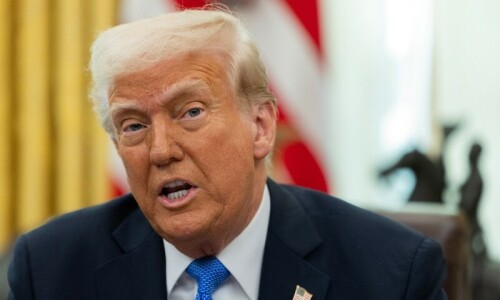TRUST in the national leadership is essential for cohesion and solidarity at all levels of civil society. Parliament, of course, is the only place where national leadership is bred. Thus, faith in the strength of parliament is amongst the most basic ingredients of a free democracy.
During the past three decades, however, parliament in both free and partly free democracies has been facing a severe crisis of public mistrust. Due to this, a spilt mandate during elections in some countries is producing hung parliaments, giving no party the majority of parliamentary members it needs to form a government independently. The impact of a hung parliament on national life is the same in all regions.
However, the reasons behind the increase of this phenomenon in Europe and South Asia vary greatly. In the West, advocates of proportional representation or strong opposition aggressively resist an absolute majority. And many parliaments, as has been seen for example in Germany, Ireland and Italy, transact their business despite having a minority government, through partnership with sections of the opposition.
Nevertheless, regardless of the strength of certain arguments in favour of hung or balanced parliaments or minority governments, cynical perceptions about democracy and politics has spread uncertainty and particularly in Europe and South Asia, even the most prodigious of parliaments have proved unable to withstand the effects of a spilt mandate.
In Pakistan, strong parliaments have tended to invite the vengeance of anti-democratic forces. Thus the parliaments formed under ZA Bhutto and Nawaz Sharif were superseded by the military regimes of Gen Zia in 1977 and Gen Musharraf in 1999 respectively. Parliaments formed in 1988, 1990, 1993 and 2008 were all hung parliaments.
A hung parliament results in the formation of a coalition government of factions, groups or small-scale political parties. These differ openly with each other on the basis of ideologies, interests and perception of international, national, local, religious, economic, social or ethnic issues. So, for instance, when the general elections of 1974 produced a hung parliament in the UK, political parties with divergent ideologies formed a coalition government and fresh elections had to be held just eight months after the Labour party had formed a minority government. All big events happen twice in history, said Arnold Toynbee, and true to his words, almost four decades later, this year's elections in the UK produced a hung parliament once again, compelling the Conservatives to form a coalition government with the Lib Dems. The allies hold different views on every issue but they believe in democracy, and are partners in the business of governance.
India, the world's largest democracy, has also faced hung parliaments. Today there is a hung parliament in India, which the Congress party literally seems to have little control over.
Unlike the experiences of free democracies, a hung parliament in Pakistan is alleged to come into existence through manipulation and engineered elections held under the sizable influence of anti-democratic forces. In order to eliminate the certain birth of a strong parliament, the military government of Gen Zia, for example, held the 1985 elections on a party-less basis. The 1988 elections under the caretaker government produced a fragile parliament, an outcome perilous to national cohesion.
Benazir Bhutto formed the government without a simple majority in the lower house and despite a hostile Senate at the centre, a rebellious provincial government in Punjab and a non-cooperative bureaucracy. In her short tenure, she survived unsuccessful no-trust moves and frequent pandemonium, rowdy scenes, furious boycotts and agitation by anti-PPP elements inside and outside parliament.
Then came the use of Article 58-2(b) that killed her government. The 1990 elections enabled Nawaz Sharif's PML to capture power, although for a brief time as then President Ghulam Ishaq Khan axed his government under Article 58-2(b).
The 1993 elections held under a caretaker government produced a hung and violent parliament. Yet again, a caretaker government-held election in 1997 gave two-thirds majority to the PML in parliament and led the way for striking out the infamous article from the constitution. That government was finally followed by the imposition of martial law in 1999.
The 2008 elections once again produced a hung parliament but this time it is a new sort of situation. Instead of the earlier history of hostility between political rivals being repeated, this time there was a more congenial atmosphere of reconciliation and cooperation — unprecedented in the country's history.
Yet the value of this fact has neither been fully recognised nor appreciated because of the deep divides in the state, its institutions and society. In order to maintain control over parliament, the state of Pakistan brutalised the political culture by allegedly encouraging non-state actors who disbelieve in discourse or dialogue but have faith in obscurantism, aggression and violence. They are afraid of the world and the world is afraid of them. Senator Raja Zafarul Haq said during a Senate debate in February on law and order that Pakistan faced a more perilous situation than Iraq, Afghanistan and Somalia.
This is what split mandates, hung parliaments and a partly free democracy have given to their breeders in Pakistan.
The writer serves in the Senate of Pakistan.
trusthem@gmail.com











































